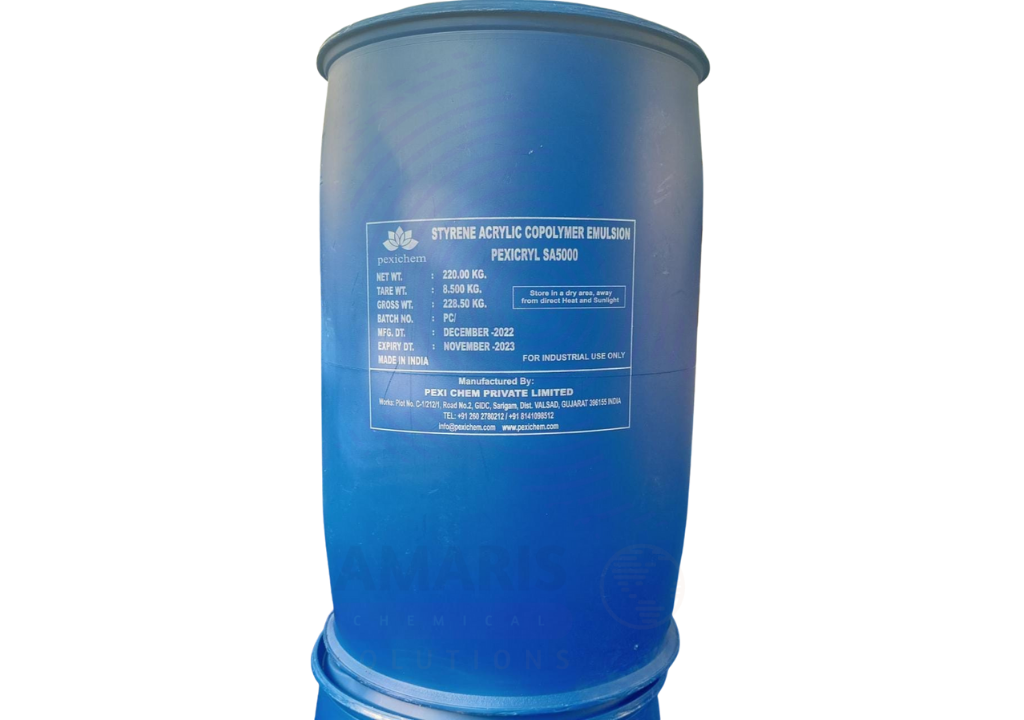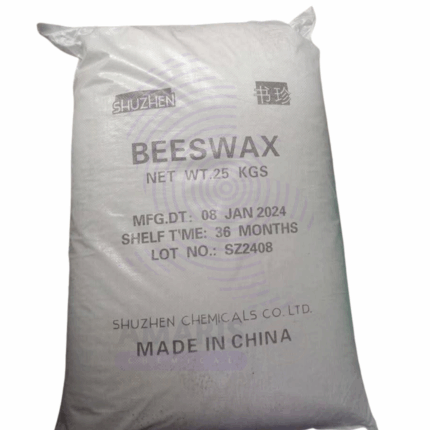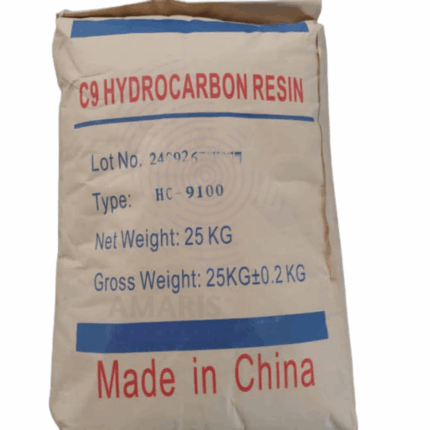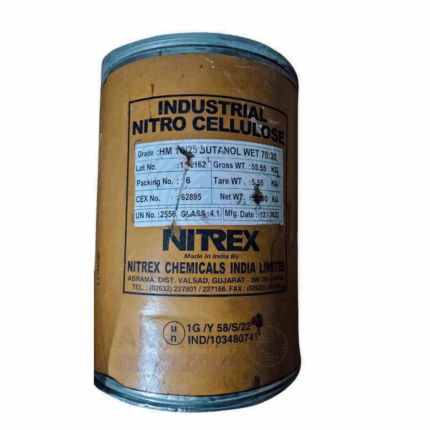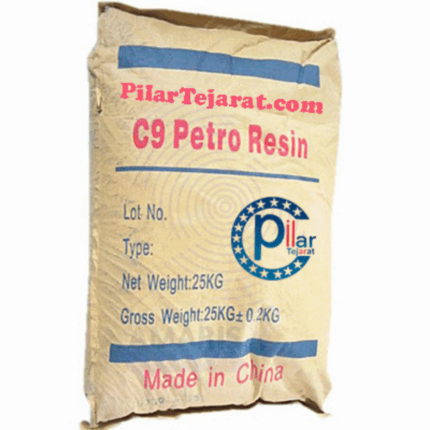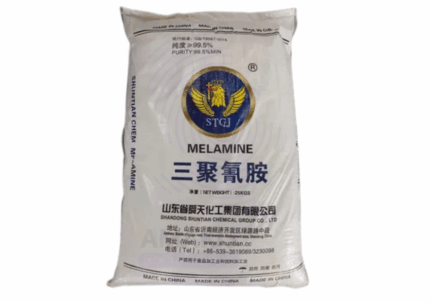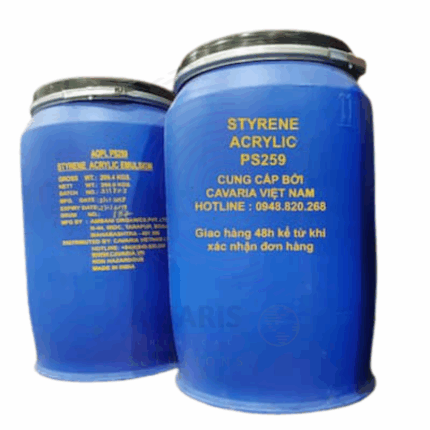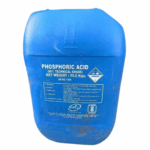
Phosphoric acid Technical Grade
$ 3.12 Original price was: $ 3.12.$ 3.10Current price is: $ 3.10.
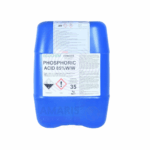
Phosphoric Acid Food Grade
$ 3.11 Original price was: $ 3.11.$ 2.99Current price is: $ 2.99.
Styrene Acrylic Emulsion Polymer
Whatsapp Order
Styrene Acrylic Emulsion Polymer is a water-based copolymer emulsion combining styrene and acrylic monomers, designed as a versatile binder with excellent film formation, adhesion, and durability. Widely used across paints, coatings, adhesives, textiles, and construction materials, this polymer offers superior weather resistance, water repellency, and flexibility. Its emulsified form enables easy incorporation into aqueous formulations, delivering enhanced performance and environmental benefits by reducing VOC emissions.
Description
Table of Contents
Toggle
Styrene Acrylic Emulsion Polymer
Primary Uses
- Paints & Coatings Industry
- Architectural Coatings: Provides strong adhesion, gloss, and flexibility in interior and exterior paints.
- Industrial Protective Coatings: Delivers resistance to corrosion, abrasion, and weathering in metal and concrete coatings.
- Wood Coatings: Improves durability and appearance in wood finishes and sealants.
- Textile Coatings: Enhances fabric durability, water resistance, and surface texture.
- Adhesives Industry
- Pressure-sensitive Adhesives: Used in tapes, labels, and films for flexible, strong bonding.
- Construction Adhesives: Offers excellent adhesion and water resistance for bonding tiles, flooring, and panels.
- Packaging Adhesives: Enables strong, fast-setting bonds for flexible and rigid packaging materials.
- Construction Materials
- Cement & Mortar Modifiers: Improves flexibility, adhesion, and water resistance in tile adhesives, grouts, and cementitious coatings.
- Sealants & Caulks: Enhances elasticity, weatherability, and durability in acrylic and silicone sealants.
- Wall Putty & Fillers: Provides smooth texture and improved binding properties.
Secondary Uses
- Textiles
- Fabric Finishing: Used for softness, stiffness, or water repellency treatments on fabrics.
- Nonwoven Fabrics: Acts as a binder to increase strength and durability.
- Paper Industry
- Surface Coatings: Enhances gloss, printability, and strength of coated papers.
- Wet Strength Additive: Improves resistance to moisture in specialty papers.
- Leather Industry
- Coatings & Finishes: Provides protective, flexible films on leather goods to improve durability and appearance.
- Plastic & Rubber Industries
- Plastic Modifier: Enhances impact resistance and flexibility in PVC and other polymers.
- Adhesion Promoter: Facilitates bonding in composites and multilayer materials.
- Printing Inks
- Binder in Water-based Inks: Improves adhesion, gloss, and durability on various substrates.
- Automotive Industry
- Coatings & Sealants: Used in automotive refinishes and sealants for durability and weather resistance.
KEY PRODUCT FEATURES
1. Basic Identification Attributes
- Chemical Name (IUPAC): Copolymer of styrene and acrylic monomers
- Common/Trade Name: Styrene Acrylic Emulsion Polymer
- CAS Number: Not applicable (copolymer)
- HS Code: 3906.90.00
- Synonyms: Styrene-acrylic copolymer emulsion, Styrene acrylic resin emulsion
2. Physical & Chemical Properties
- Physical State: Milky white liquid emulsion
- Color & Odor: White; mild odor
- Solubility: Dispersible in water; insoluble in organic solvents
- pH: Typically 7.0–9.0 (neutral to mildly alkaline)
- Solid Content: 40–55% (varies by grade)
- Viscosity: Low to medium viscosity depending on formulation
- Density: Approx. 1.0–1.1 g/cm³
3. Safety & Hazard Attributes
- GHS Classification: Not classified as hazardous
- Toxicity: Low toxicity under normal handling conditions
- Exposure Limits: Follow standard occupational safety practices
4. Storage & Handling Attributes
- Storage Conditions: Store in sealed containers, protected from freezing and direct sunlight, ideally between 5–35 °C
- Container Type: Plastic drums, totes, or bulk containers
- Shelf Life: 6–12 months depending on storage conditions
- Handling Precautions: Avoid freezing, contamination, and prolonged skin contact
5. Regulatory & Compliance Attributes
- Manufactured under Good Manufacturing Practices (GMP)
- Complies with REACH, TSCA, and OSHA HCS regulations
- Suitable for use in low-VOC and environmentally friendly formulations
- Meets standards for VOC content in paints and coatings
6. Environmental & Health Impact
- Biodegradability: Partially biodegradable under aerobic conditions
- Ecotoxicity: Low toxicity to aquatic organisms
- Bioaccumulation: Not significant
- Environmental Notes: Proper wastewater treatment recommended to prevent polymer residues in effluent
SAFETY HANDLING PRECAUTIONS
Safety Handling Precautions
- PPE Required: Gloves and eye protection recommended
- Handling Guidelines: Use adequate ventilation; avoid skin and eye contact
- Storage Measures: Keep containers tightly closed, protected from freezing and contamination
First Aid Measures
- Inhalation: Move to fresh air if irritation occurs
- Skin Contact: Wash with soap and water
- Eye Contact: Flush with water for 15 minutes; seek medical attention if irritation persists
- Ingestion: Rinse mouth; seek medical advice if necessary
Firefighting Measures
- Fire Hazards: Non-flammable in emulsion form; dried polymer is combustible
- Extinguishing Media: Water spray, foam, dry chemical, or CO₂
- Hazardous Combustion Products: Carbon monoxide, carbon dioxide, and other organic combustion products
Related products
Beeswax
Beeswax is a natural wax produced by honeybees of the genus Apis. It is secreted by worker bees from specialized glands and used to build honeycomb cells. Beeswax is a complex mixture of esters, fatty acids, and hydrocarbons, characterized by a pale yellow to brown color, a pleasant honey-like aroma, and a firm yet pliable texture. It has excellent emulsifying, binding, and protective properties, making it widely used in cosmetics, pharmaceuticals, food, and industrial applications. Beeswax is prized for its natural origin, biodegradability, and skin-friendly characteristics.
Hycryl
Hycryl is a specialized acrylic copolymer resin designed primarily for industrial and cosmetic applications. It appears as a white to off-white powder or granules with excellent film-forming, adhesive, and thickening properties. Known for its compatibility with a wide range of solvents and plasticizers, Hycryl 77 provides excellent clarity, flexibility, and durability in coatings, adhesives, and personal care formulations. Its balanced molecular weight and functional groups enable it to deliver strong binding and aesthetic properties in both aqueous and solvent-based systems.
Hydrocarbon Resins
Hydrocarbon Resins C5 And C9 Petroleum Resins are synthetic petroleum-derived resins produced through the polymerization of C5 (pentene) and C9 (nonene) fraction monomers. These resins appear as pale yellow to amber solid materials, usually in pellet or flake form, characterized by tackifying and adhesive properties. C5 resins are derived from aliphatic hydrocarbons, while C9 resins originate from aromatic hydrocarbons. Often blended, these resins provide a balance of hardness, tackiness, and compatibility with various polymers. Widely used as tackifiers, binders, and modifiers, C5 & C9 hydrocarbon resins enhance performance in adhesives, coatings, rubber compounding, and more.
Lacitex
Lacitex is a high-quality natural latex concentrate derived from Hevea brasiliensis (rubber tree) latex. It is a milky, white colloidal suspension primarily used in the manufacture of latex-based products such as gloves, adhesives, coatings, and foam rubber. Lacitex offers excellent film-forming properties, elasticity, and tensile strength. It provides superior binding, water resistance, and flexibility in finished products, making it widely valued in various industrial and manufacturing applications.
Nitro Cellulose
Nitro Cellulose is a highly flammable compound produced by nitrating cellulose through exposure to nitric acid and sulfuric acid. It is a versatile material widely used in coatings, lacquers, explosives, and propellants due to its film-forming properties and rapid drying capability. Nitro Cellulose is available in various grades depending on the nitrogen content and viscosity, making it suitable for industrial, commercial, and military applications.
Petroleum Resin C9 Hydrocarbon
Petroleum Resin C9 Hydrocarbon is a thermoplastic hydrocarbon resin derived from the C9 fraction of petroleum cracking. It is a tackifying resin with excellent compatibility with various polymers, especially in adhesives, paints, rubber, and coatings industries. Known for its good color stability, fast curing, and strong adhesion properties, C9 Petroleum Resin enhances product performance in many industrial applications.
Setamine ( Melamine Resin)
Setamine (Melamine Resin) is a thermosetting polymer widely used for its excellent hardness, chemical resistance, and thermal stability. It is produced by the reaction of melamine with formaldehyde and is commonly utilized in coatings, laminates, adhesives, and molding compounds. Setamine offers superior durability, scratch resistance, and moisture resistance, making it ideal for high-performance surface finishes and industrial applications.
Styrene Acrylic
Styrene Acrylic is a copolymer emulsion combining styrene and acrylic monomers, widely used as a versatile binder in coatings, adhesives, and construction materials. It offers excellent film-forming properties, adhesion, water resistance, and durability. This product enhances the performance and longevity of paints, sealants, textiles, and paper coatings, with flexibility for both indoor and outdoor applications. Styrene Acrylic emulsions are designed to meet stringent industrial and environmental standards.


 Preservatives(food)
Preservatives(food) Flavor Enhancers
Flavor Enhancers Acidulants
Acidulants Sweeteners
Sweeteners Antioxidants
Antioxidants Colorants(food)
Colorants(food) Nutraceutical Ingredients (food)
Nutraceutical Ingredients (food) Nutrient Supplements
Nutrient Supplements Emulsifiers
Emulsifiers
 Collectors
Collectors Dust Suppressants
Dust Suppressants Explosives and Blasting Agents
Explosives and Blasting Agents Flocculants and Coagulants
Flocculants and Coagulants Frothers
Frothers Leaching Agents
Leaching Agents pH Modifiers
pH Modifiers Precious Metal Extraction Agents
Precious Metal Extraction Agents
 Antioxidants(plastic)
Antioxidants(plastic) Colorants (Pigments, Dyes)
Colorants (Pigments, Dyes) Fillers and Reinforcements
Fillers and Reinforcements Flame Retardants
Flame Retardants Monomers
Monomers Plasticizers
Plasticizers Polymerization Initiators
Polymerization Initiators Stabilizers (UV, Heat)
Stabilizers (UV, Heat)
 Antifoaming Agents
Antifoaming Agents Chelating Agents
Chelating Agents Coagulants and Flocculants
Coagulants and Flocculants Corrosion Inhibitors
Corrosion Inhibitors Disinfectants and Biocides
Disinfectants and Biocides Oxidizing Agents
Oxidizing Agents pH Adjusters
pH Adjusters Scale Inhibitors( water)
Scale Inhibitors( water)
 Antioxidants(cosmetic)
Antioxidants(cosmetic) Emollients
Emollients Fragrances and Essential Oils
Fragrances and Essential Oils Humectants
Humectants Preservatives
Preservatives Surfactants(cosmetic)
Surfactants(cosmetic) Thickeners
Thickeners UV Filters
UV Filters
 Fertilizers
Fertilizers Soil Conditioners
Soil Conditioners Plant Growth Regulators
Plant Growth Regulators Animal Feed Additives
Animal Feed Additives Biostimulants
Biostimulants Pesticides (Herbicides, Insecticides, Fungicides)
Pesticides (Herbicides, Insecticides, Fungicides)
 Active Pharmaceutical Ingredients (APIs)
Active Pharmaceutical Ingredients (APIs) Excipients
Excipients Solvents(pharmaceutical)
Solvents(pharmaceutical) Antibiotics
Antibiotics Antiseptics and Disinfectants
Antiseptics and Disinfectants Vaccine Adjuvants
Vaccine Adjuvants Nutraceutical Ingredients (pharmaceutical)
Nutraceutical Ingredients (pharmaceutical) Analgesics & Antipyretics
Analgesics & Antipyretics
 Analytical Reagents
Analytical Reagents Solvents(lab)
Solvents(lab) Chromatography Chemicals
Chromatography Chemicals Spectroscopy Reagents
Spectroscopy Reagents microbiology-and-cell-culture-reagents
microbiology-and-cell-culture-reagents Molecular Biology Reagents
Molecular Biology Reagents Biochemical Reagents
Biochemical Reagents Inorganic and Organic Standards
Inorganic and Organic Standards Laboratory Safety Chemicals
Laboratory Safety Chemicals Specialty Laboratory Chemicals(Special Laboratory Equipment)
Specialty Laboratory Chemicals(Special Laboratory Equipment)
 Demulsifiers
Demulsifiers Hydraulic Fracturing Fluids
Hydraulic Fracturing Fluids Scale Inhibitors(oil)
Scale Inhibitors(oil) Surfactants(oil)
Surfactants(oil) Drilling Fluids
Drilling Fluids
 Dyes and Pigments
Dyes and Pigments Bleaching Agents
Bleaching Agents Softening Agents
Softening Agents Finishing Agents
Finishing Agents Antistatic Agents
Antistatic Agents
 Admixtures
Admixtures Waterproofing Agents
Waterproofing Agents Sealants and Adhesives
Sealants and Adhesives Curing Compounds
Curing Compounds Concrete Repair Chemicals
Concrete Repair Chemicals Anti-Corrosion Coatings
Anti-Corrosion Coatings
 Surfactants(cleaning)
Surfactants(cleaning) Builders
Builders Enzymes
Enzymes Solvents (Cleaning)
Solvents (Cleaning) Fragrances
Fragrances
 Electronic Chemicals
Electronic Chemicals Catalysts
Catalysts Lubricants
Lubricants Photographic Chemicals
Photographic Chemicals Refrigerants
Refrigerants Automotive chemicals
Automotive chemicals Pyrotechnic Chemicals
Pyrotechnic Chemicals
 Biodegradable Surfactants
Biodegradable Surfactants Bio-based Solvents
Bio-based Solvents Renewable Polymers
Renewable Polymers Carbon Capture Chemicals
Carbon Capture Chemicals Wastewater Treatment Chemicals
Wastewater Treatment Chemicals
 Pigments
Pigments Solvents(paint)
Solvents(paint) Specialty Coatings
Specialty Coatings Binders/Resins
Binders/Resins Additives
Additives Driers
Driers Anti-Corrosion Agents
Anti-Corrosion Agents Functional Coatings
Functional Coatings Application-Specific Coatings
Application-Specific Coatings
 Leavening Agents
Leavening Agents Dough Conditioners
Dough Conditioners Flour Treatments
Flour Treatments Fat Replacers
Fat Replacers Decoratives
Decoratives Preservatives(baking)
Preservatives(baking)
 Plasticizers & Softeners
Plasticizers & Softeners Reinforcing Agents
Reinforcing Agents Adhesion Promoters
Adhesion Promoters Vulcanizing Agents
Vulcanizing Agents Antidegradants
Antidegradants Blowing Agents
Blowing Agents Fillers & Extenders
Fillers & Extenders Accelerators & Retarders
Accelerators & Retarders